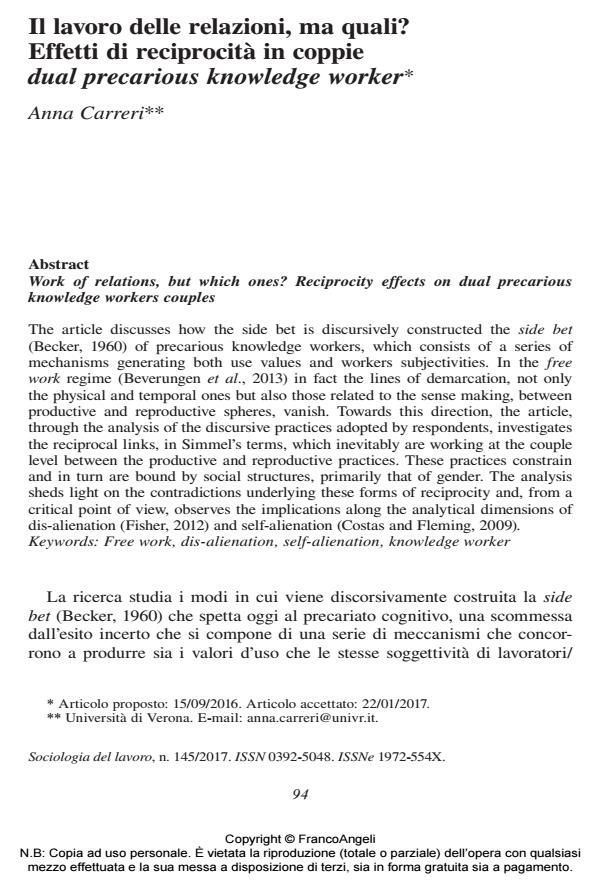Work of relations, but which ones? Reciprocity effects on dual precarious knowledge workers couples
Journal title SOCIOLOGIA DEL LAVORO
Author/s Anna Carreri
Publishing Year 2017 Issue 2017/145
Language Italian Pages 18 P. 94-111 File size 133 KB
DOI 10.3280/SL2017-145006
DOI is like a bar code for intellectual property: to have more infomation
click here
Below, you can see the article first page
If you want to buy this article in PDF format, you can do it, following the instructions to buy download credits

FrancoAngeli is member of Publishers International Linking Association, Inc (PILA), a not-for-profit association which run the CrossRef service enabling links to and from online scholarly content.
The article discusses how the side bet is discursively constructed the side bet (Becker, 1960) of precarious knowledge workers, which consists of a series of mechanisms generating both use values and workers subjectivities. In the free work regime (Beverungen et al., 2013) in fact the lines of demarcation, not only the physical and temporal ones but also those related to the sense making, between productive and reproductive spheres, vanish. Towards this direction, the article, through the analysis of the discursive practices adopted by respondents, investigates the reciprocal links, in Simmel’s terms, which inevitably are working at the couple level between the productive and reproductive practices. These practices constrain and in turn are bound by social structures, primarily that of gender. The analysis sheds light on the contradictions underlying these forms of reciprocity and, from a critical point of view, observes the implications along the analytical dimensions of dis-alienation (Fisher, 2012) and self-alienation (Costas and Fleming, 2009).
La ricerca studia i modi in cui viene discorsivamente costruita la side bet (Bec-ker, 1960) che spetta oggi al precariato cognitivo, una scommessa dall’esito incer-to che si compone di una serie di meccanismi, che concorrono a produrre sia i va-lori d’uso che le stesse soggettività di lavoratori/trici. Nel regime di free work (Beve-rungen et al., 2013), difatti, le linee di demarcazione, non solo quelle fisiche e tem-porali ma anche quelle legate alla dimensione del senso e dei significati, fra ambito produttivo e riproduttivo svaniscono. Spingendo oltre lo sguardo analitico, in que-sto articolo si è cercato, attraverso l’analisi delle pratiche discorsive adottate, di esplorare i nessi di reciprocità, in senso simmeliano, che inevitabilmente si attivano all’interno della coppia fra le pratiche produttive e riproduttive, pratiche che vinco-lano e a loro volta sono vincolate da strutture sociali, in primis quella di genere. L’analisi fa luce sulle con(trad)dizioni alla base di queste forme di reciprocità fra i diversi lavori di relazione intra-coppia, osservandone criticamente le implicazioni lungo le dimensioni analitiche della dis-alienazione (Fisher, 2012) e dell’auto-alienazione (Costas e Fleming, 2009).
Keywords: Free work, dis-alienation, self-alienation, knowledge worker
- Fare marcia indietro. Barriere e risorse nella costruzione dei percorsi lavorativi desiderati dalle donne Anna Carreri, in SOCIOLOGIA DEL LAVORO 148/2017 pp.75
DOI: 10.3280/SL2017-148005
Anna Carreri, Il lavoro delle relazioni, ma quali? Effetti di reciprocità in coppie dual precarious knowledge worker in "SOCIOLOGIA DEL LAVORO " 145/2017, pp 94-111, DOI: 10.3280/SL2017-145006